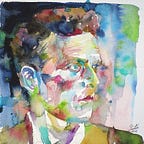On CTT, the Scope Problem, and Transcendental Arbitration
I plan to write more comprehensively on all three of these topics in the future, but for now consider this a preliminary work outlining the bases of these concepts.
Let me start by defining terms. CTT is my abbreviation of the Correspondence Theory of Truth. CTT has been largely accepted in the field of philosophy, with the exception of pushback from groups like Bradlian Idealists, who endorse the Coherence Theory of Truth, and American Pragmatists, who are quite obviously Pragmatists. The basic schema of Correspondence Theory is as follows: S is true iff S corresponds to a fact, where S is a sentence [1]. What exactly this correspondence relation is between sentence and fact differs on the type of Correspondence Theorist you’re talking to, as does what a ‘fact’ is. In this paper I’ll be focusing on monistic Correspondence Theories. Essentially, Correspondence Theories which claim that their schema can be applied universally, irregardless of domain.
Allow me to preface my introduction of the Scope Problem by establishing that when I say CTT from this point forward, I am in no way referring to pluralistic conceptions of the Correspondence Theory of Truth (i.e. the McTaggartan theory), but rather the monistic conception of CTT.
Before putting forth the Scope Problem, I’ll establish that different domains are, not that their being necessitates a pluralist conception of truth, but simply that they are. For example, you have the domain of physical things (think real-world physical objects like the Moon; “The Moon is spherical”), the domain of non-physical abstract concepts (think propositions like “Erik is funny”), the domain of moral propositions, or at least propositions with some kind of moral baggage (think “Erik is good”), and the domain of arithmetic propositions (think 2+2=4). Here we have four distinctly different domains which are all supposedly universally answered for through our monistic CTT’s schema. I’m here to show that they aren’t. That there aren’t always referents in reality for all propositions, regardless of negative or positive truthmakers. Now, to what extent a Correspondence Theorist can answer for propositions of all four domains depends on what kind of theory they follow. For example, a light-Correspondence Theorist following Wittgenstein’s conception of CTT would argue that the ‘facts’ referred to in the Correspondence schema are physical in nature: atomic facts, or tractarian facts. A Wittgensteinian Correspondence Theorist can answer for the domain of physical things and purport a moral skepticism to avoid answering for the domain of propositions with moral baggage. However, it seems that all monistic Correspondence Theorists fail to answer for the domain of arithmetic and arithmetic propositions.
After thorough discussion with my good friend Jack, who was inclined towards a correspondence theory, we came to the conclusion that the only workaround to this inability to apply the correspondence schema to arithmetic was to endorse a pluralistic CTT. One that evaluates the truth of arithmetic propositions under the domain of arithmetic, not attempting to tie the truth-value of all propositions back to the same schema. After all, to work around this from a monistic CTT perspective, one would have to prove that numbers have physical referents that they can actively correspond to, and that arithmetic propositions can be assigned a truth-value from said physical referents.
The introduction of the Scope Problem and the Logical Mixing Problem to truth discourse has threatened the tenability of all monistic and pluralistic theories of truth [2]. So, you might ask, where do we go from here? My answer is: outward [3].
We can transcend scope as well as the circularity of truth. You see, truth is a self-affirming concept, as is logic, and in this circularity, this self-affirmation ad-infinitum, the tenability and universality of both concepts is wiped. If logic needs truth and truth is dependent on logic yet also on itself for self-affirmation which is dependent on logic which is dependent on truth, etc etc, then the concepts are not at all universal or absolute, in fact they’re quite the opposite. This does not necessitate that we simply reject philosophy, just that we must transcend philosophy as we know it, or in the words of Evan Jack, we must “complete” it. I argue that there is, in fact, a monistic “theory of truth” which surpasses these restricted criticisms of truth, like the Scope Problem.
The schema of this transcendental theory of truth is as follows: X is true iff X is arbitrated as true by a transcendental arbiter. This is a two-tiered theory of truth. The truth of X is dependent on the arbitration of X which is dependent on what is assigned to it by the transcendental arbiter in question. In this case, the transcendental arbiter is simply competition. Denial of this arbiter, arbitration or theory of truth only goes to further affirm it all, so rejection is more than welcome. For more on a defense of this theory, I’d like to point you to a passage written by my good friend, Erik, who, along with Evan Jack, came up with this theory of truth, schema, and transcendental arbitration. https://evanjackdebate.medium.com/notes-for-transcendental-aribtration-1-a472ebfd282c
[1]- This schema is taken from Michael Butler’s work ‘Deflationism and Semantic Theories of Truth’
[2]- As expanded upon in Christopher Dyer’s ‘Problems With Truth: Scope, Mixing, and Truth Pluralism’
[3]- This outwardness, or transcendence exists solely because of the work of Evan Jack and Erik S., and full credit of Transcendental Arbitration goes to them.
